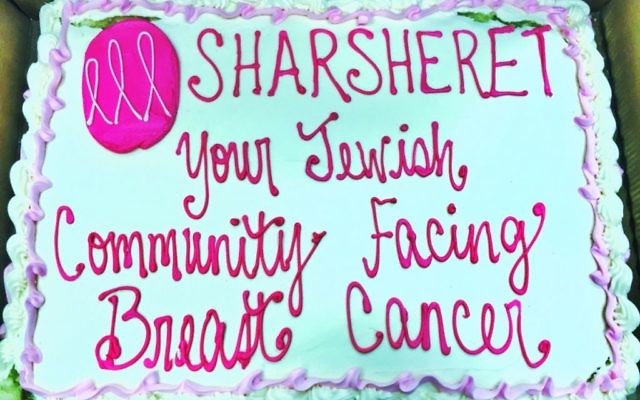Sharsheret Supplies Breast Cancer Support
By Adina Rudisch
Now or later? That question is being asked in millions of homes around the country.
Women are trying to decide when to schedule their first mammogram. The American Cancer Society recommends starting annual mammograms at age 45 and moving to every other year at age 55 for women with average risk.
“Average risk” is the operative term. “For most Jewish women of Ashkenazi descent, these guidelines do not apply,” writes Elana Silber, the executive director of Sharsheret. One in 40 Jewish women of Ashkenazi descent carries a BRCA gene mutation linked to breast cancer, compared with one in 345 in the general population.
Unfortunately, we don’t hear about that increased risk in the news.
So what is a Jewish woman to do? The most important step is to learn about her family history to better gauge her personal risk.
The second? Call, email or visit www.sharsheret.org. I found out about Sharsheret when I was diagnosed with breast cancer at age 34, just weeks after giving birth to my son. To say I was overwhelmed would be an understatement.
A friend recommended I call Sharsheret, which was founded in 2001 to address the specific needs of young women facing breast cancer. The organization has expanded to serve Jewish women and families of all ages who face the risk of breast and ovarian cancer.
At the time, I needed to speak to someone who was going through an experience similar to mine — who had young children, who wondered whether expanding her family was possible and how being diagnosed at this age was different from being diagnosed after 60.
Sharsheret, which means “link” or “chain,” paired me with a young Jewish woman who had received a similar diagnosis, had young children and even had the same degree of religious observance. It was such a relief to speak to someone who had been through this and come out the other side.
My link did not tell me what to do, but she shared her experience and resources. Most of all, she gave me hope and strength.
This was the beginning of a now-eight-year relationship with Sharsheret. I have participated in many conference calls about nutrition, current research, Jewish spirituality, family support and more. While I was undergoing treatment, Sharsheret sent me materials to keep track of my appointments, questions to ask my doctors, toys to entertain my children, and a pillow to rest my arm on after surgery.
The organization continues to support me by offering teleconferences on survivorship issues, updates on recent research and even help with religious life issues.
Congregation Shearith Israel recently organized a Sharsheret Pink Shabbat. We ate pink challah, drank pink lemonade, and heard from and honored survivors of breast cancer. I shared information from and about Sharsheret, and many people left with a new resource and a Sharsheret tzedakah box. Our shul also participated in Pies for Prevention, a fundraiser in which volunteer bakers donated their time and money to bake kosher pies for Thanksgiving, with all the profits going directly to Sharsheret.
So to answer the question of now or later: Tell all the Jewish families you know now about Sharsheret and have them call 866-474-2774. Staff will help answer their questions about breast and ovarian cancer and counsel them about genetic testing, personal risk, the new screening guidelines, and even nutrition and exercise.
They will thank you later.






comments